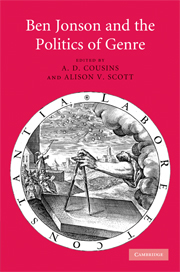Book contents
- Frontmatter
- Contents
- Notes on contributors
- Acknowledgements
- Introduction
- Chapter 1 Feigning the commonwealth: Jonson's Epigrams
- Chapter 2 The Jonsonian masque and the politics of decorum
- Chapter 3 The politics (and pairing) of Jonson's country house poems
- Chapter 4 Style, versatility, and the politics of the epistles
- Chapter 5 Jonson's politics of gender and genre: Mary Wroth and ‘Charis’
- Chapter 6 Jonson's metempsychosis revisited: patronage and religious controversy
- Chapter 7 Jonson's humanist tragedies
- Chapter 8 A generic prompt in Jonson's Timber, or Discoveries
- Bibliography
- Index
Chapter 2 - The Jonsonian masque and the politics of decorum
Published online by Cambridge University Press: 30 June 2009
- Frontmatter
- Contents
- Notes on contributors
- Acknowledgements
- Introduction
- Chapter 1 Feigning the commonwealth: Jonson's Epigrams
- Chapter 2 The Jonsonian masque and the politics of decorum
- Chapter 3 The politics (and pairing) of Jonson's country house poems
- Chapter 4 Style, versatility, and the politics of the epistles
- Chapter 5 Jonson's politics of gender and genre: Mary Wroth and ‘Charis’
- Chapter 6 Jonson's metempsychosis revisited: patronage and religious controversy
- Chapter 7 Jonson's humanist tragedies
- Chapter 8 A generic prompt in Jonson's Timber, or Discoveries
- Bibliography
- Index
Summary
Since Stephen Orgel's groundbreaking publication The Illusion of Power, the politics of Jonson's masques have largely been treated in terms of New Historicism, with criticism often focusing on ‘tracing how the binary structure of the masque – its division between dominant masque and subordinated antimasque – parallels the polarised conceptual, discursive and political oppositions along these two axes’. Despite the obvious advantages of the historicist approach, it has in practice led to masques being reinserted ‘back into a scenario of power and its inescapable confluences that … increasingly looks formulaic and transhistorical’, as Martin Butler has observed; and the most recent commentaries have thus sought new ways of thinking about the genre. David Lindley made an early attempt in that vein to avoid over-simplifying the paradoxical impulses of the masque, noting that ‘the struggle within the poet's work to sustain the transmutation of the circumstances of the Jacobean court and its politics into self-sufficient myth’ is the ‘true fascination of the genre’. Similarly, Butler's later readings of individual masques interrogate the poet's struggle with or ‘negotiation’ of the transformation of contingent, courtly realities into constant, transcendental myth. I want to extend those discussions here by considering a further dimension of the poet's political struggle, namely the way in which Jonson draws attention in his masques to the paradoxical nature of the genre's political work (truthfully reflecting and truthfully praising James and his court), and then deliberately evokes classical ideas of kairos (timeliness) and decorum (seemliness) in order to forge a feasible reconciliation of those contraries – in effect, to keep multiple truths in play at once.
- Type
- Chapter
- Information
- Ben Jonson and the Politics of Genre , pp. 43 - 72Publisher: Cambridge University PressPrint publication year: 2009



